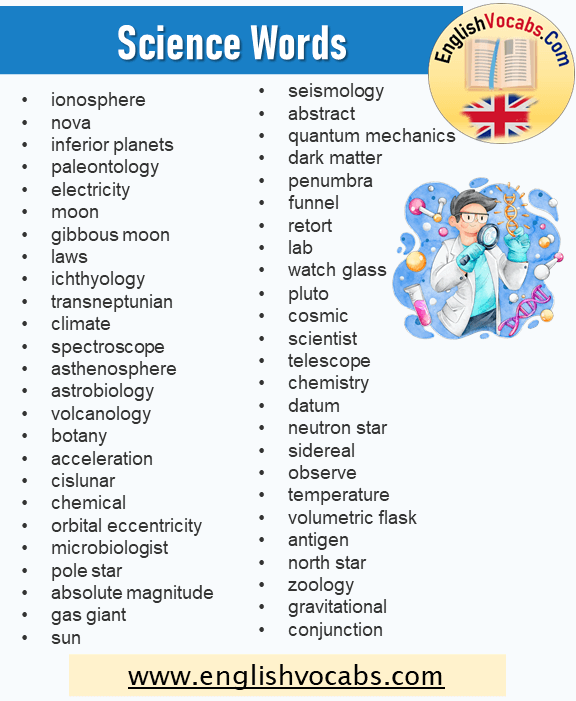Science Words List in English, Science Vocabulary and Example Sentences

Table of Contents
Science Words
Science is a working field about discovering and fully describing subject matter by observing and experimenting with the surrounding world. Branches such as biology, chemistry, and physics are branches of science. There are many words related to science. Knowing the science-related words in English is of great importance. Because the importance given to science in daily life is very high. Therefore, words related to science are frequently used in English sentences in daily life.
The most popular words related to science are as follows and can be exemplified in a sentence:
- Astronomy: He learned a lot of information about the planets through astronomy.
- Biology: They learned the structure of plants in the biology course. In this way, they could easily identify the plants.
- Cell: Every human body is made up of cells.
- Chemistry: We learned the structure and functions of matter in chemistry class.
- Experiment: With experiments on guinea pigs in biology, the subjects were understood much better.
- Genetics: They were obtaining GMO products by modifying the genetics of foods.
- Laboratory: Experiments were carried out easily thanks to the materials in the laboratory.
- Magnetism: Magnetism created by a magnetic field is a physical phenomenon.
- Scientist: Scientists carry out many studies to get rid of diseases.
- Temperature: The recent increase in temperature was one of the effects of global warming.
- Physics: We covered energy and forces in detail in the physics lesson.
- Climate: Changes in climates were due to the damage caused by human beings to the environment recently.
- Energy: Every object has its energy.
- Gravity: Thanks to gravity, people can press the ground.
- Mineral: Minerals are things that should be found in every human body.
- Thermometer: Thanks to the thermometer, we can measure the temperature of the places we are in.
- Observatory: She had been working at the observatory for many years to monitor events in space.
Why Is It Important to Know Scientific Vocabulary in English?
People will have to use scientific words while studying or talking in daily life. Especially in education life, words related to science are mentioned in every lesson. Students understand the lessons better by knowing the scientific vocabulary. Many professional workers such as engineers, doctors, and teachers are intertwined with science in the workplace. Therefore, they have to know the scientific information in their field. Thus, people use scientific words correctly in English. It is very important to take care of the correct usage by knowing scientific words in daily life.
Detailed Science Words List
1. ionosphere
2. nova
3. inferior planets
4. paleontology
5. electricity
6. moon
7. gibbous moon
8. laws
9. ichthyology
10. transneptunian
11. climate
12. spectroscope
13. asthenosphere
14. astrobiology
15. volcanology
16. botany
17. acceleration
18. cislunar
19. chemical
20. orbital eccentricity
21. microbiologist
22. pole star
23. absolute magnitude
24. gas giant
25. sun
26. seismology
27. abstract
28. quantum mechanics
29. dark matter
30. penumbra
31. funnel
32. retort
33. lab
34. watch glass
35. pluto
36. cosmic
37. scientist
38. telescope
39. chemistry
40. datum
41. neutron star
42. sidereal
43. observe
44. temperature
45. volumetric flask
46. antigen
47. north star
48. zoology
49. gravitational
50. conjunction
51. research
52. spectrum
53. roche limit
54. astronomy
55. microscope
56. measure
57. scale
58. syzygy
59. supernova
60. phase
61. rings
62. free fall
63. black body
64. acid rain
65. ecliptic
66. theory
67. acetylcholine
68. azimuth
69. geophysics
70. control
71. white dwarf
72. mercury
73. biology
74. new moon
75. mass
76. universe
77. burette
78. dwarf star
79. absolute zero
80. white giant
81. bunsen burner
82. ornithology
83. translunar
84. comet
85. data
86. variable
87. experiment
88. arithmetic mean
89. acid
90. geostationary
91. mare
92. terrestrial
93. interstellar
94. barlow lens
95. radiant
96. organism
97. observatory
98. x-rays
99. blue moon
100. artificial selection
101. matter
102. aquifer
103. nebula
104. herpetology
105. petri dish
106. flyby
107. climatologist
108. big bang theory
109. entomology
110. visual magnitude
111. solar system
112. tissue
113. apex predator
114. cuvette
115. graduated cylinder
116. interstellar dust
117. radiation
118. aquatic
119. laboratory
120. red shift
121. physics
122. helium
123. atomic mass
124. electrochemist
125. light year
126. binary star
127. lepidoptery
128. fact
129. element
130. absorb
131. twinkling
132. absolute temperature
133. physical science
134. biochemistry
135. mars
136. mineral
137. red giant star
138. geology
139. arrhenius, svante
140. abiogenesis
141. wavelength
142. gegenschein
143. beaker
144. black hole
145. solar wind
146. hypothesis
147. meteorologist
148. gravitational lens
149. astrophysics
150. kirkwood gaps
151. virologist
152. science
153. cell
154. lunar
155. umbra
156. background radiation
157. magnetism
158. immunology
159. cluster
160. nasa
161. energy
162. celestial
163. pulsar
164. parallax
165. deneb
166. genetics
167. zodiac
168. mineralogy
169. apogee
170. archimedes
171. meteorology
172. outer planets
173. atom
174. archaea
175. motion
176. coriolis force
177. volume
178. accuracy
179. pipette
180. hydrogen
181. oort cloud
182. weigh
183. perturbation
184. test tube
185. gravity
186. light-year
187. flare
188. thermometer
189. evolution
190. synodic
191. atomic number
192. quarter moon
193. astronomer
194. artery
195. microbiology
196. day
197. particle
198. aristotle
199. atomic mass unit
200. inner planets


